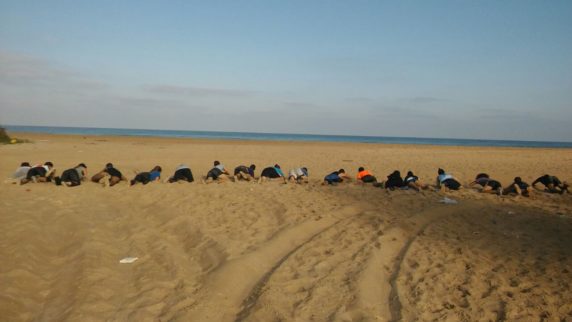Preparing to Enter the IDF
For many of our participants, entering the IDF in a meaningful role is not only a way to contribute to the country, but also a way to improve their future, for social mobility. The way to succeed? Come mentally and physically prepared…
At Derech Eretz, we view preparation for the army from a holistic approach. For starters, everything we do that prepares our participants for life prepares them for the army as well: leadership training, independence, working as a team, building a sense of personal and communal responsibility, acquiring the skills to cope with challenges, learning not to give up, and more. All of these life lessons are equally important both in the army and after.
“Our whole mentality has become stronger,” says Danielle from the Derech Eretz Nitzana campus 2016-17 cohort, “We are more prepared for situations, and have the tools do deal with these situations. We also realize that there is another way to do things – to get up and go to class, even when you are tired, not to give in and not to give up. It’s not only the big things, but the little things as well. Not to be lazy. To get up and run in the morning, to clean up after yourself, to delve into the projects we are developing. Each one of us has the ability to lead and contribute and there is no doubt that every day that we are here we are developing and becoming empowered. I certainly am.”
The fact that Derech Eretz participants leave their homes to come to our campuses prepares them for being away from home for a prolonged period of time. Once on campus, the fact that Derech Eretz participants come from all over the country – cities, towns, kibbutzim, youth villages, and from varying socio-economic and ethnic backgrounds, allows them to encounter and interact with others even before they have to do so in the army. Our graduates attest to having been away from home and having interacted with people from different backgrounds as two very important factors in coming prepared to the army. “Many 18-year olds equate the experience of entering the army to being slapped in the face – waking up one morning to a completely different reality. Derech Eretz program graduates certainly do not feel the slap quite as hard,” says Co-Founder and joint CEO Avi Cohen, “it’s still a different reality, but they know how to handle it. They’ve seen it, discussed it, felt it – and now that it’s there, they’re prepared to make the best of it.”
Throughout our 6-month program, participants prepare physically in order to improve their abilities. Three times a week, participants do core strength training: running, push-ups, cardio-vascular activities, and various exercises. These activities are similar in nature to those done in the army, and they gradually build strength and increase in difficulty. Each participant’s improvement is monitored individually.
Outdoor training at Derech Eretz is a gradual process. We begin with an overnight hike, and approximately every 4 weeks, there is a week-long outdoor hike. Throughout the hikes, participants learn to care for our environment, meet people from different backgrounds along the way, see the different landscapes of our country but also learn to be self-sufficient, to set up a tent, learn to ration food, and learn to navigate. Coming with this skill set to the army provides a significant advantage.
Beyond physical preparation throughout the program, we dedicate a specific week to exposure to the IDF. Throughout this week, participants must be in uniform, counsellors become Drill Sergeants, there are early morning wake up calls and formation, and cellphones are taken away. Activities include visiting army bases, learning of the different roles in the army, meeting and speaking to program graduates about their current army experience, group discussions about ethics and situations that commonly arise, and more.
Our 2016-17 cohorts each visited 2 bases, including Bahad 1, a military training base where most soldiers will go to become officers. They received a guided tour and the opportunity to meet with soldiers of different ranks and ask questions. One of the Derech Eretz cohorts also visited a base where one of their counsellors was in military reserves at the time, and excited to see him in that capacity.
Back on our campuses, we hosted our program graduates who are currently serving in the army so that they can share their own, current experiences with our participants, and give them the chance to ask questions, talk about common issues, ethical dilemmas, options of different roles, and more. Tali was one of our alumni who arrived.
Derech Eretz Co-Founders and joint CEOs Yonatan Kischinovsky and Avi Cohen also met with program participants to shed their perspective on going into the army. They had actually met in the army. Yonatan served as a tank commander in the armored corps and in the army’s course for tank commanders while Avi was a captain, and headed the formulation of the commander course for Merkava Mark IV tanks. He commanded a tank platoon during Operation Defensive Shield in 2002.
At the end of the week, one-on-one meetings also took place between participants and counselors allowing further processing and an opportunity to receive answers to additional questions that had arisen.

